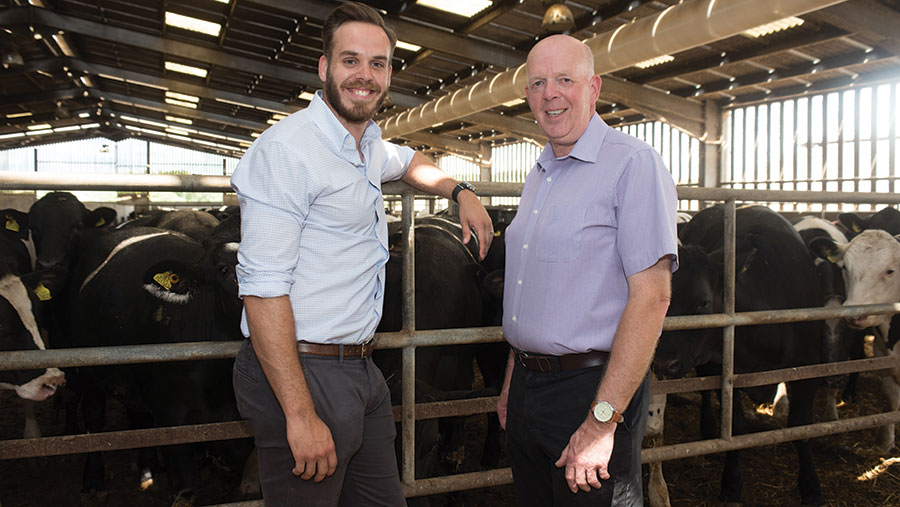Beef sector lacks incentive for meat quality, farmers say
 Michael and Ian Sturmer © Hugh Nutt
Michael and Ian Sturmer © Hugh Nutt Processors and supermarkets are missing out on opportunities to grow the value of beef by failing to pay farmers a premium for meat with good eating quality.
That’s the conclusion of Michael and Ian Sturmer, Farmers Weekly 2019 Beef Farmers of the Year, who are concerned that the UK is falling behind rival beef producing nations such as Australia, Japan and the US.
Abattoirs in these countries have systems in place to grade beef based on its tenderness and other traits linked to eating quality such as marbling, which has driven up the price consumers are willing to pay for meat.
See also: 4 reasons to use artificial insemination in beef herds
In a Japanese Wagyu beef carcass, what a UK butcher would ordinarily regard as tougher, cheaper cuts can be sold for a premium as they have superior eating quality, they said.
The ability to add value to a bigger proportion of a carcass by marketing more of it as cuts rather than it being minced is also likely to be essential in future if current interest in plant-based alternatives to meat is maintained, as mince will be easier to replicate.
No incentive
But the father-and-son team, who finish more than 4,500 dairy-bred steers each year in partnership with seven other farms, say the UK’s Europ grid grading system does not incentivise farmers to produce beef that the consumer is willing to pay a premium for.
“You don’t eat yield, you eat meat,” says Ian. “When you buy British, you are only buying value. You can’t eat value.”
Modifying the grid would be a key part of helping the beef industry stay competitive against global rivals that will be looking to sell more beef into the UK under the terms of post-Brexit trade deals, they say.
It will also help contribute to farmers staying on the right side of consumer opinion in the ongoing debate over whether red meat is healthy and sustainable, and help shoppers justify paying the premium over cheaper chicken and pork.
Complete package
That’s because farming practices that promote high-animal welfare, such as minimising stress, are closely aligned with improved eating quality and can bolster the perception that British beef is the best in the world.
“If we could tell the British consumer that buying British is buying sustainable and this was linked in with eating quality as well, then you have the complete package,” says Ian.
“We need to drive change in the whole of the agricultural sector. It is coming and if we don’t get ahead of the sustainability issue, we are in trouble.”
Creating a financial incentive will unlock the other changes that need to take place, of which the most important is additional research into the genetic traits that are linked to eating quality.
What farmers can do now to improve carcass quality
- Genetics Consider avoiding the leanest breeds which will have the lowest marbling.
- Stress management Keep animals in the same social groups as much as possible.
- Feed management Keep ration consistent to maintain growth rate, whether it be a fast-rate intensive system or a slower paced one.
- Recording performance Where possible, record sire as well as dam of calf. Monitor growth rates routinely and use data to influence breeding decisions.
Source: Michael and Ian Sturmer
More research needed
“We have fallen behind with the lack of research in the past 30 years. Dairy, pigs, poultry – yes, but what has happened in the beef industry?” asks Michael.
Creating estimated breeding values (EBVs) for eating quality would contribute to increased consistency of product and particularly help dairy farmers who are using beef genetics to improve the saleability of their product, he says.
One investigation to amend that is a four-year project by processor Dunbia, livestock analytics company Breedr and Scotland’s Rural College (SRUC) to drive improvements in production efficiency and productivity growth within the beef sector by more than £500m.
Little is known about the study, as Dunbia say some of the data is commercially sensitive, but it is scheduled to conclude in March 2022.
About Farmers Weekly Awards 2020
 The Farmers Weekly 2020 Beef Farmer of the Year Award is sponsored by ABP.
The Farmers Weekly 2020 Beef Farmer of the Year Award is sponsored by ABP.
Join Farmers Weekly in celebrating the farming industry and recognising the hard work of UK farmers and enter the awards today.
Alternatively, nominate a deserving individual for an award.
For more information about the Farmers Weekly Awards 2020, pay a visit to the official website.
This is part of our Where Are They Now (WATN) series, catching up with former FW awards winners.
